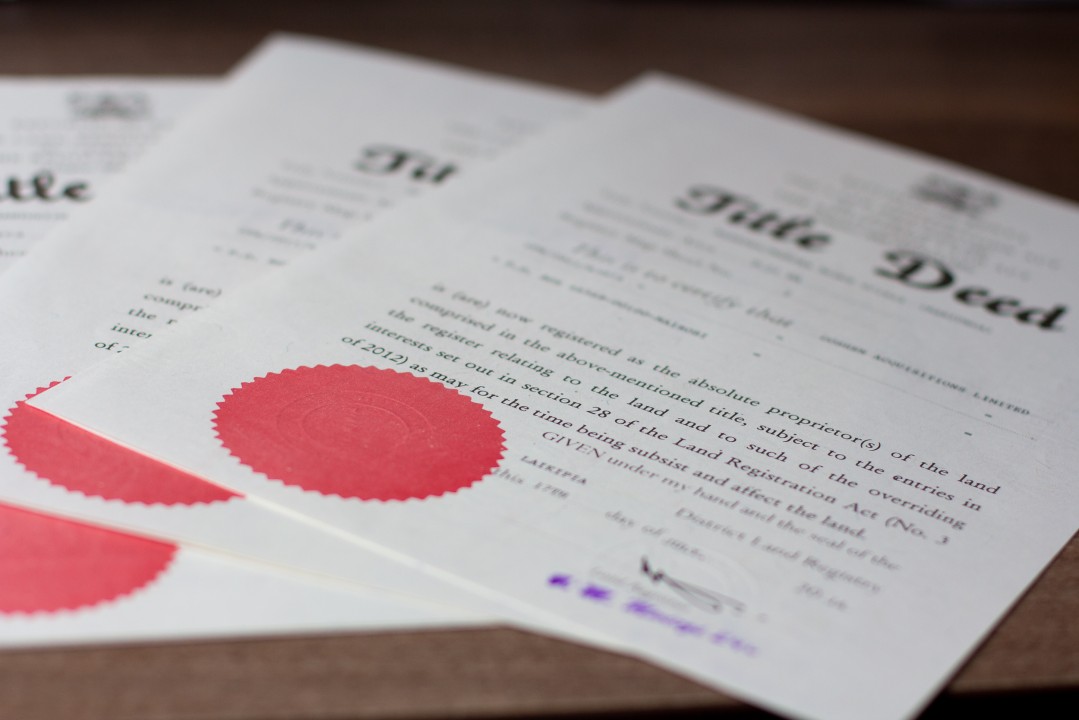Title Deeds in Thailand
Title Deeds in Thailand. Land ownership in Thailand is governed by a structured system of title deeds issued and regulated by the Thai Land Department. Understanding the nature of Thai land title documents is essential for property buyers, investors, developers, and foreign nationals seeking lawful property interests in the country.
Unlike some jurisdictions where ownership rights are uniform, Thailand recognizes several categories of land documents, each granting different levels of possession, use, and ownership rights. Failure to properly verify a land title may expose buyers to serious legal risks, including ownership disputes, construction restrictions, or inability to transfer property rights.
This article provides a detailed examination of Thailand’s land title deed system, legal classifications, ownership rights, transfer procedures, verification requirements, and practical considerations for property transactions.
Legal Framework Governing Land Ownership in Thailand
Land ownership and registration in Thailand are primarily regulated under:
-
the Land Code B.E. 2497 (1954),
-
Ministerial Regulations issued by the Ministry of Interior, and
-
administrative procedures enforced by the Thai Land Department.
The Land Department maintains official land records and oversees registration of ownership, transfers, mortgages, leases, and other real property rights.
Ownership rights become legally enforceable only upon registration with the competent Land Office.
Importance of Title Deeds in Property Transactions
A title deed serves as official government confirmation of legal rights over land. It establishes:
-
ownership or possessory rights,
-
land boundaries,
-
permitted land use,
-
registered encumbrances,
-
mortgages or lease rights.
Because Thailand operates under a registration-based property system, possession alone does not guarantee ownership unless supported by a legally recognized title document.
Major Types of Title Deeds in Thailand
Thailand recognizes several land document classifications, ranging from full ownership titles to limited possession certificates.
Chanote (Nor Sor 4 Jor)
The Chanote title deed represents the highest form of land ownership in Thailand.
Key characteristics include:
-
full ownership rights,
-
precise land survey using GPS coordinates,
-
clearly defined boundary markers,
-
immediate transferability,
-
eligibility for sale, lease, or mortgage registration.
Chanote land allows construction and development subject to zoning regulations.
Because boundaries are officially surveyed, disputes regarding land size or location are significantly reduced.
Nor Sor 3 Gor
Nor Sor 3 Gor titles provide confirmed possessory rights with substantial legal security.
Features include:
-
officially measured land plots,
-
government-recognized possession,
-
ability to sell or transfer ownership,
-
upgrade eligibility to Chanote status.
Although boundaries are mapped, physical survey markers may not always exist on-site.
Conversion to Chanote status is commonly possible upon formal application.
Nor Sor 3
Nor Sor 3 land grants recognized possession but with less precise surveying compared to Nor Sor 3 Gor.
Important limitations include:
-
boundaries referenced by neighboring plots rather than precise coordinates,
-
requirement for public notice before transfer,
-
potential boundary uncertainty.
Buyers must conduct additional due diligence before purchasing such land.
Sor Kor 1
Sor Kor 1 documents represent notification of land possession rather than ownership.
These documents:
-
confirm historical occupation,
-
do not grant ownership rights,
-
cannot be directly sold or transferred.
Upgrading to higher title status may be possible under certain administrative procedures.
Purchasing land supported only by Sor Kor 1 carries significant legal risk.
Foreign Ownership Considerations
Thai law generally restricts foreign nationals from owning land directly.
However, foreigners may legally obtain property interests through:
-
long-term registered leases,
-
condominium ownership under the Condominium Act,
-
investment structures compliant with Thai law.
Verification of the underlying land title remains critical even when foreigners acquire indirect property rights.
Title Deed Registration and Transfer Process
Transfer of land ownership must occur at the local Land Office where the property is registered.
The process typically involves:
-
verification of ownership records,
-
confirmation of seller identity,
-
review of registered encumbrances,
-
execution of transfer documentation,
-
payment of taxes and transfer fees,
-
registration of ownership change.
Legal ownership transfers only upon official registration, not upon private agreement or payment.
Encumbrances and Registered Rights
Title deeds may contain registered legal interests affecting ownership.
Common encumbrances include:
-
mortgages,
-
usufruct rights,
-
superficies rights,
-
leases,
-
servitudes or access rights.
Buyers must review the reverse side of the title deed or Land Office records to identify existing obligations attached to the land.
Failure to examine encumbrances may result in unexpected legal restrictions after purchase.
Title Verification and Due Diligence
Proper due diligence is essential before entering any land transaction.
Verification typically includes:
-
confirming title authenticity at the Land Office,
-
checking ownership history,
-
reviewing registered liens,
-
verifying zoning classification,
-
confirming access to public roads,
-
ensuring compliance with environmental or planning laws.
Physical inspection should confirm that land boundaries match official registration data.
Land Measurement and Boundary Issues
Boundary disputes occasionally arise where land has not been precisely surveyed.
Professional land surveys may be conducted through the Land Department to confirm:
-
accurate land size,
-
encroachment risks,
-
alignment with registered coordinates.
Accurate boundary verification becomes particularly important for development projects.
Upgrading Land Titles
Certain possessory titles may be upgraded to higher ownership status.
Upgrading procedures generally require:
-
proof of lawful possession,
-
absence of ownership disputes,
-
government survey approval.
Conversion to Chanote significantly increases land value and marketability.
Taxes and Fees Associated with Title Transfers
Property transfers involve statutory fees and taxes payable at registration, including:
-
transfer fee,
-
stamp duty,
-
specific business tax (where applicable),
-
withholding tax.
Allocation of payment responsibility is typically negotiated between buyer and seller but finalized at registration.
Common Legal Risks in Thai Land Transactions
Property buyers frequently encounter risks such as:
-
purchasing land without proper title verification,
-
reliance on unofficial possession claims,
-
undisclosed mortgages,
-
restricted land use zoning,
-
lack of legal road access.
Professional legal review minimizes exposure to these risks.
Role of the Land Department
The Thai Land Department functions as the central authority responsible for:
-
maintaining ownership records,
-
issuing title deeds,
-
registering property rights,
-
resolving administrative land matters.
All legally enforceable real estate rights must be registered within this system.
Practical Considerations for Investors and Buyers
Before purchasing land in Thailand, buyers should ensure:
-
the title type supports intended use,
-
ownership records are accurate,
-
land access is legally registered,
-
development permissions are available,
-
transfer procedures comply with legal requirements.
Understanding title classifications is fundamental to secure property investment.
Conclusion
Title deeds form the legal foundation of land ownership in Thailand, determining the scope of rights, transferability, and development potential associated with property. The distinction between various land documents significantly affects ownership security and investment value.
Careful verification of title status, registration records, and encumbrances is essential for any real estate transaction. By understanding Thailand’s land title system and complying with registration procedures, buyers and investors can secure legally protected property interests while minimizing transactional risk within the Thai real estate market.










